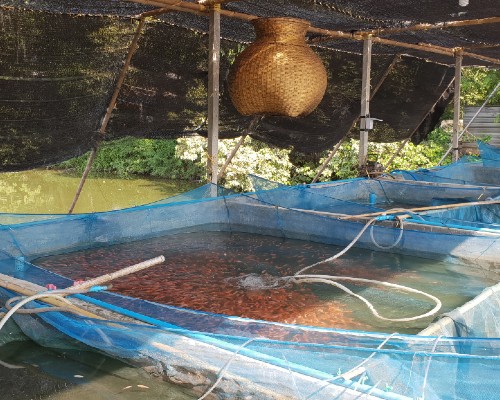
An aquaculture farm in Thailand Dr Ginny Gould (UoB)
The GW4 Alliance (Bath, Bristol, Cardiff and Exeter universities - GW4) formally launched their new 'One Health' antimicrobial resistance research consortium this week [Wednesday 16 June]. The World Health Organisation cites antimicrobial resistance (AMR) as one of the most significant risks facing the world. AMR threatens global health and development as it impacts on human, animal and plant health and also our environment, water safety and food security.
The GW4 AMR Alliance has been established to tackle this global challenge and become the UK's leading interdisciplinary 'One Health' AMR research consortium, recognised worldwide.
A launch event showcasing GW4's cross-disciplinary AMR research collaborations and some of the One Health AMR projects and programmes being undertaken by GW4 teams and their collaborators including University of Bristol researchers who discussed some of their latest findings from AMR research projects. Antimicrobial resistance where bacterial, fungal, viral and parasitic infections become resistant to existing antimicrobial drugs is an increasing global societal threat, as there is no matching increase in new antibiotics or new therapies to help treat patients' infections.
The COVID-19 pandemic has brought the 'pandemic' of AMR into sharper focus. Antimicrobial use, which drives the emergence of AMR, increased in many intensive care units around the world, as clinicians mitigated the development of secondary bacterial and fungal infections in acutely ill hospitalised patients. AMR is a slower moving, 'silent pandemic' but requires urgent action now to stop resistance expanding and find drugs to treat these infections.
The GW4 AMR Alliance builds on and enhances the GW4 universities' strong and diverse portfolio of AMR research. Its vision is to tackle AMR using a One Health approach and to be the partner of choice for future AMR research consortia funding to help mitigate the urgent threat of AMR.
During the launch, Dr Kristen Reyher, leader of Bristol's AMR Force research group at Bristol Vet School, Matthew Avison, Professor of Molecular Bacteriology from Bristol's School of Cellular and Molecular Medicine, and Helen Lambert, Professor of Medical Anthropology at Bristol Medical School, addressed AMR 'known unknowns' as well as the link between climate change and AMR, and presented their latest research findings from projects in Thailand, Argentina and China.
Professor Avison, lead PI of the One Health Drivers of AMR in Thailand (OH-DART) project, discussed the key levers that could be pulled to help mitigate the threat of AMR in the country which, in 2010 was estimated to have caused 38,000 deaths and an economic loss of 1.2 billion US$ per year. This is mostly due to antibacterial resistance (ABR) which is common in bacteria isolated from humans, animals and the environment. He also discussed a recent paper modelling the impacts of antimicrobial usage changes in farming and human medicine.
Dr Reyher presented the latest findings from the Bristol-led One Health Selection and Transmission of Antimicrobial Resistance (OH-STAR) study and their implications for surveillance of AMR on farms, including advice about sampling from the same sites on farms, controlling for temperature in sampling and using a consistent sampling technique.
Professor Lambert, lead PI of the UK-China AMR Partnership Hub STAR-CHINA, discussed the social and cultural drivers which underpin the threat of AMR such as antibiotic prescribing and environmental exposure via water use practices, highlighting the need for interventions that alter AMR transmission pathways to take patterns of human behaviour into account.
Dr Timothy Jinks, Head of the Drug-Resistant Infections Programme at theWellcome Trust, who is delivering the keynote lecture, said: "Containing and controlling AMR requires collaborative, long-term, interdisciplinary and sustainable research taking a global One Health approach. It is great news that the GW4 AMR Alliance is launching to increase understanding, development and implementation of effective interventions."
GW4's proven academic excellence in AMR research across disciplines and across institutions is demonstrated by a portfolio of AMR relevant research funding in excess of £40m.
Dr Joanna Jenkinson, GW4 Alliance Director, commented: "Our strategic initiative is in total accord with the G7 Health Ministers' recent communique (on 4 June) which outlined the need to act on the growing pandemic of AMR with 'clear leadership, bold science-based actions and a One Health approach, 'recognising and understanding that the health of humans, animals, plants and their shared environment are inextricably interlinked'. The GW4 has fostered collaborative AMR projects at scale to achieve more than our institutions can individually. We are also proud to support our early career researchers (ECR) through our Crucible programme on 'Interdisciplinary Approaches to AMR' and opportunities to apply for seed funding. We are delighted that one new ECR AMR community, further supported by our GW4 Generator Award funding scheme, is contributing a presentation at the launch today on their project to find new antibiotic leads".
AMR disproportionately affects low-and-middle income countries and the research being showcased today demonstrates our global reach with collaborative GW4 projects taking place in Thailand, China, Bangladesh, Argentina, India and here in the UK. GW4 researchers are exploring what drives the emergence of AMR in different settings e.g. the environment (particularly in aquatic systems from industrial and domestic waste), livestock farming, aquaculture and healthcare.
Identifying the drivers of AMR will help to help modify them by informing policy and implementing interventions to mitigate this rising threat. In the UK alone, there was a nine per cent increase in deaths caused by drug-resistant infections between 2017 and 2018.
Chair of the GW4 AMR Alliance, Prof Eshwar Mahenthiralingam (Cardiff University), said: "This is a very exciting and timely consortium bringing the considerable AMR research strengths across the GW4 universities together to work as one cohesive unit to drive forward our understanding of, and to develop new interventions for containing and controlling AMR."






